U.S. Export Curbs on China’s Chip Industry Spark Concern Over Supply Chain Stability
The U.S. government is urgently working to address the unintended consequences of its recently announced export curbs on China's semiconductor industry, amid concerns that the new restrictions could disrupt the global semiconductor supply chain.
These new measures, which require U.S. companies to obtain licenses before exporting advanced chip-making equipment to China, were intended to curb China's technological and military capabilities. However, the restrictions have raised alarms over potential disruptions to the supply chain, impacting international semiconductor companies operating in China.
Temporary authorizations for SK Hynix and TSMC
In response to these concerns, the U.S. Department of Commerce has granted temporary authorizations to key players in the semiconductor industry. South Korean memory chipmaker SK Hynix received approval to continue receiving goods for its chip production facilities in China without the need for additional licenses. This authorization aims to help stabilize the supply chain and is valid for one year.
Additionally, Taiwan Semiconductor Manufacturing Company (TSMC) secured a one-year license to continue ordering U.S. chip-making equipment for its expansion in China, including its facility in Nanjing. This temporary license will enable TSMC to continue its production plans without immediate disruption.

Balancing trade policies and supply chain stability
The Biden administration initially aimed to spare foreign companies such as SK Hynix and Samsung Electronics from the full impact of these restrictions, but the published rules did not explicitly exempt these firms. As a result, businesses operating in China have been grappling with uncertainty over the impact on their production lines.
The rules also extend to non-U.S. suppliers if their support involves U.S. companies or personnel. Without proper licensing, even essential items like light bulbs, springs, and bolts that are critical to the functioning of chip-making equipment could be affected.
Efforts to mitigate the impact
Sources indicate that the U.S. government is exploring longer-term solutions to mitigate the impact of the restrictions on the semiconductor supply chain. In the meantime, the temporary authorizations for SK Hynix and TSMC are seen as stopgap measures to keep production running smoothly while more comprehensive strategies are developed.
The restrictions are part of the U.S. government's broader strategy to address national security concerns related to China's access to advanced semiconductor technologies. However, officials are mindful of the risks to global supply chains and are taking steps to avoid unintended consequences that could affect technology industries worldwide.